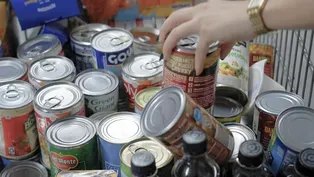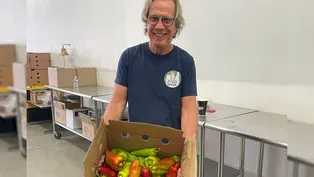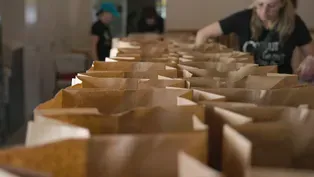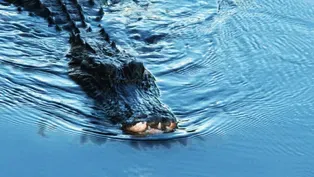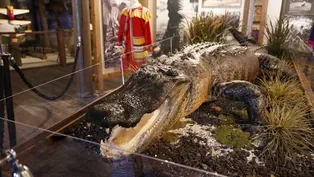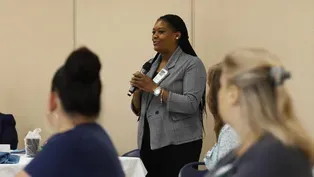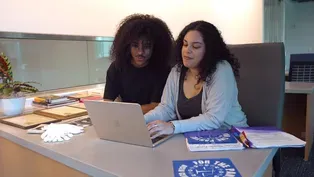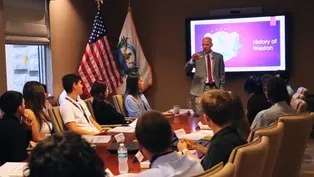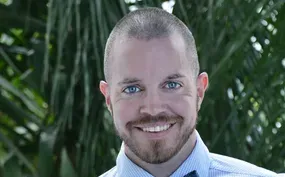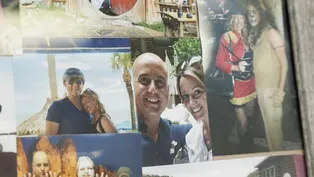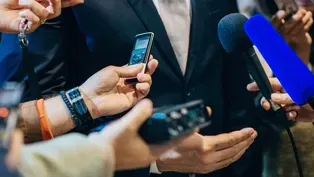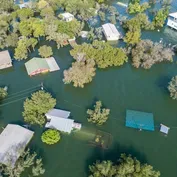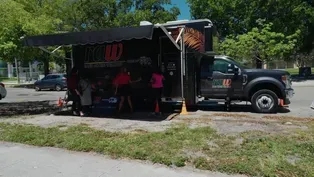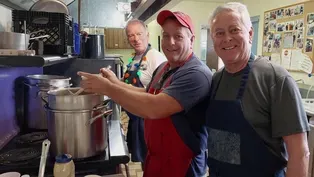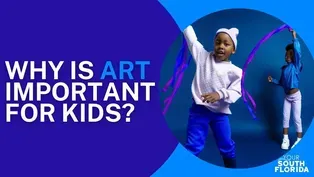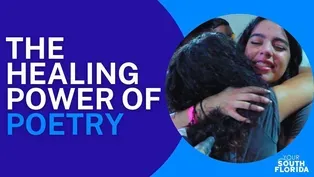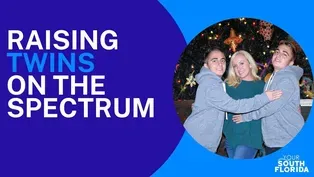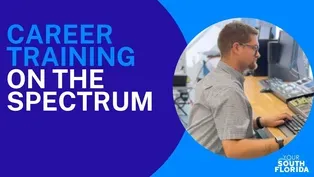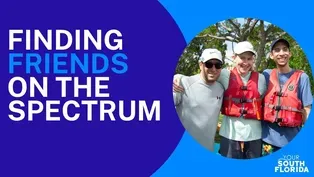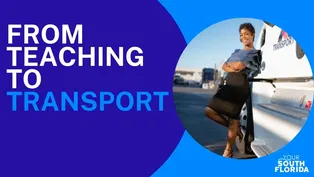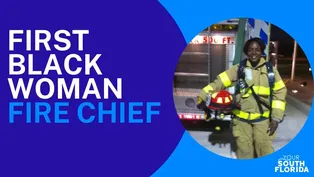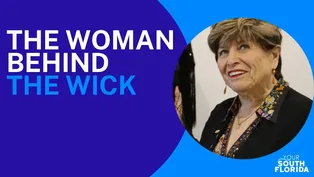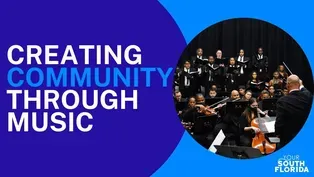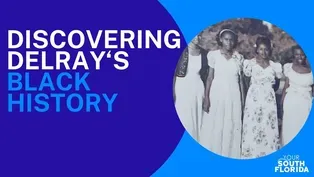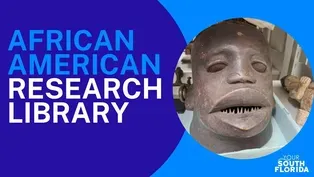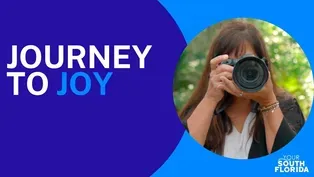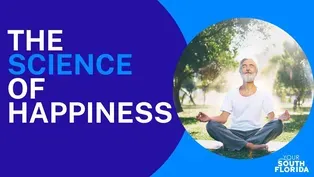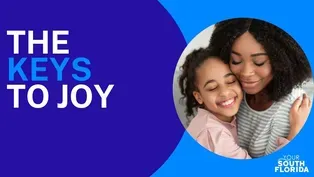Your South Florida
Preparing for Extreme Weather
Clip: Season 8 | 12m 25sVideo has Closed Captions
The threat of flooding is becoming the new normal in South Florida, well outside of Hurricane Season
The threat of flooding is becoming the new normal in South Florida, well outside of Hurricane Season. That’s why emergency management officials want residents to be disaster ready year-round. From knowing your flood zone to building a disaster kit, Mary Blakeney from Palm Beach County’s Emergency Management provides best practices and resources to keep communities safe.
Problems with Closed Captions? Closed Captioning Feedback
Problems with Closed Captions? Closed Captioning Feedback
Your South Florida is a local public television program presented by WPBT
Your South Florida
Preparing for Extreme Weather
Clip: Season 8 | 12m 25sVideo has Closed Captions
The threat of flooding is becoming the new normal in South Florida, well outside of Hurricane Season. That’s why emergency management officials want residents to be disaster ready year-round. From knowing your flood zone to building a disaster kit, Mary Blakeney from Palm Beach County’s Emergency Management provides best practices and resources to keep communities safe.
Problems with Closed Captions? Closed Captioning Feedback
How to Watch Your South Florida
Your South Florida is available to stream on pbs.org and the free PBS App, available on iPhone, Apple TV, Android TV, Android smartphones, Amazon Fire TV, Amazon Fire Tablet, Roku, Samsung Smart TV, and Vizio.
Providing Support for PBS.org
Learn Moreabout PBS online sponsorship(Arlene) Aside from life threatening heat, another worry for South Floridians extreme rain events causing dangerous flooding in much of our region.
Here to share how Palm Beach County prepares for such extreme weather and resources for residents is Mary Blakeney, director of Palm Beach County's Public Safety Department in the Division of Emergency Management.
You have a big job.
Yes, especially down here.
Absolutely.
We never know what the hazard might be.
So, you.
Know, there is such a great effort at the Public Safety Department.
Tell us more about the goals and how you see in the vision for it.
Well, you know, there's a lot of hazards that can impact us in South Florida.
So, you know, preparedness is all the same, whether we're preparing for a flood or a hurricane or even a wildfire.
The most important thing is that people take the time to make a plan and build a supply kit and be prepared.
But the first step in all of that is understanding what could impact them in their community.
It’s really important that people know their own individual community and the risks that they're faced with and as well as understand what impacts them at their home.
And that's really important for people to really take some time and understand those hazards and those disasters that can impact them.
(Arlene) Right.
And right now, what I think the most impactful thing we're dealing with is back in May, we felt extreme heat that the temps could have been maybe in August.
Tell us about that.
And what's the plan of action?
(Mary) Well, you know, we're really taking an approach in Palm Beach County.
And I know a lot of our peers in South Florida in general, are really taking time to educate our residents about extreme heat and what can impact them, but also educate them about the resources that are in our community each and every day.
So, for example, in Palm Beach County, when we've had heat advisories come out, most recently, we've sent out information to our residents so we could educate them where our public libraries are at.
You know, it's a perfect time for people to go inside of a public library, read a good book, maybe surf the internet, and take that time to cool down, especially in the where the heat is the most extreme in midday.
And then also take advantage of public spaces like parks and rec, splash pads or pools, or even go to the beach.
Because really, we're worried about that, that midpoint of the day when the heat is the most extreme.
(Arlene) What about those who are unsheltered migrant workers?
(Mary) There are some of those resources, and we've really done a good job at trying to do that outreach and education to our business community, as well as some of those places where the homeless and those migrant workers are outside.
You know, we need to make sure that there's access to to water and that they have opportunities to rest and go in the shade.
And we really rely on getting that information out to those individuals that those farmers that are using those types of workers to educate them about that as well.
We’ve done that throughout our county, working with our agricultural industry, but also we've worked with our homeless outreach teams and our law enforcement because they're the ones that interact each and every day with some of our homeless population and educate them about going out there, speaking to those individuals and telling them to stay hydrated, get out of the direct sunlight.
You know, it's a constant education campaign when it comes to these hazards that are becoming more and more common.
(Arlene) Right?
Absolutely.
South Koreans has seen a flooding, you know, way, way outside of what we've seen in hurricane season, even.
How do people protect themselves and their properties there?
Know your zone.
I've seen that.
What would you recommend.
(Mary) So individuals really need to understand their home.
First of all um, people have a have confusion at times about when we when we talk about evacuation zones for hurricanes and then when we talk about flood zones, there are two very different things.
Um, evacuation zones have everything to do with storm surge, but flood zones have everything to do with what could be inland flooding.
People, first of all, need to understand if they live in both an evacuation zone or a flood zone, the next thing that they need to do is any home can flood, regardless of being in a flood zone with extreme events that we're having.
We've seen homes outside of flood zones have flood water inundation.
The best way to protect your home and your property is to make sure you get flood insurance.
And that's very separate.
That's a separate flood insurance.
It's a separate policy from your homeowner's insurance.
We know that that's a difficult time right now when we talk about insurance.
Yes.
Um, but really the cost is minimal to take advantage of a flood insurance policy.
And it could really protect an individual's entire life savings if they've invested in, in their home.
People need to really take advantage of taking advantage of flood insurance.
(Arlene) Do you know where someone might know where they can find out their zone?
(Mary) Yeah.
Each of the county emergency management websites will show individuals they usually have a lookup tool for.
In Palm Beach County, you can simply type in your home address.
And it's we have a very simple lookup tool to look up if you're in an evacuation zone for hurricanes, or also what your flood zone is.
Most county emergency management websites have that information.
Simple, easy tool to look up a matter of minutes to find out information about where you live.
(Arlene) And what I hear.
A lot is don't rely on your city or county to do everything for your private property.
It's really important to be ahead of the game because there's limited resources out there.
(Mary) Individuals really need to take the time now to be prepared.
Um, and we need to be prepared all year long.
Flooding can happen outside of hurricane season, but then we're always worried about hurricane season as well.
And there are several risks.
I mean, we're in South Florida.
We're susceptible to tornadoes.
Floods.
Yeah.
Um, hurricanes.
People need to be ready for any and all of those hazards.
So they need to make that that plan for what them and their family are going to do in the event of a disaster.
But also, that's why we tell people, you know, make a disaster supply kit, and we tell individuals to have that supply kit for 5 to 7 days.
We encourage you to have seven days.
That way you don't have to leave your home at any point.
You know what a lot of people don't realize about Florida, and South Florida in particular, is the way our drainage system was set up.
It's set up to hold water in the streets.
It's set up to hold water in the swales.
That's okay.
It is okay if you have water in your swale or water on your street.
What is not okay is when it starts coming into your home.
That's when it's a problem.
You need to understand what flood history has happened in your community.
And if you've had flooding in your street, that's okay because that's part of the flood control system.
And that's why we encourage people to have that supply kit, because if they have to be sheltered in their home and not leave, they're ready with at least seven days worth of supply.
So they can do that.
(Arlene) Anything about what not to do.
(Mary) So what we don't want people to do is venture out, right?
Um, whether it's flood waters or whether it's just immediately after a hurricane, people need to stay in their homes while they can.
If they can, that's if floodwaters are not coming in.
That's a that's a different story.
But if there's water outside in your street or in your swale or there's downed trees, you need to stay inside because we don't know what hazards are lurking in that water.
The water can be contaminated.
There could be downed power lines.
So individuals need to stay at home if they can if water is intruding your home, then you need to to call and call your local emergency number and work on how you're going to get out of your home.
If you can leave safely in your own vehicle or walk out, then they can do that.
But you need to call those emergency officials.
If your home starts to have water intrusion.
(Arlene) How do you get those communications out, especially for those trying to get out of their home, but they rely on public transit?
(Mary) Yeah, it's really difficult because in some areas, you know, our public transit system can't drive through flooded streets.
A lot of the levels of the buses are very low.
So those individuals, you know, each of our counties have an emergency communication system where we can actually notify individuals on their landlines and their cell phones.
We can actually take an area, a geospatial area, and actually make an emergency call to those residents residing in that area.
And we really only save that type of communication for those public safety, life threatening emergencies.
But if it's something like an area that's experiencing floods, you will get an automatic call on your phone, people need to heed those warnings.
If they get a warning about a flash flood or a hurricane warning, those are going because you're in imminent danger of that situation and you need to heed those warnings.
(Arlene) And that's.
Alert.
PBC, at least in Palm Beach County.
(Mary) In Palm Beach County is alert PBC.
But each of the South Florida communities have some version of an alert.
But also that could be launched by our weather service partners as well.
Some of those systems are automated and can be launched either through the National Weather Service or your local county emergency management.
(Arlene) And it's not just the county that can help in these situations.
Residents can also be relied upon.
You have a program called CERT.
Tell us a little bit more about that.
And that's an acronym for Something longer I'm sure correct.
(Mary) Each of the communities have what we call CERT teams, community emergency response teams.
It's basically neighbor helping neighbor type of a situation.
And the CERT program is actually a 24-hour curriculum.
It's free of charge for individuals to take advantage of that.
And you learn things from basic search and rescue to first aid, to going through the basic things you need to know.
Turning off the gas line using a fire extinguisher.
It’s a really good program for residents to take.
And then communities.
There are several communities which have formed a team of members in their community to be able to go around and help their neighbors in times of disaster.
(Arlene) And teenagers can do it, too.
(Mary) Absolutely.
And Palm Beach County, we've launched launched a teen Cert program where we've had high school aged students go through the program.
And it's actually sometimes the high school age students talking about the program at home have encouraged their parents to go through the CERT program.
The more we can be prepared within our communities, the better off we are, the more resilient we are in times of disaster.
(Arlene) And we keep hearing about this season being active.
We need all hands on deck.
Teenagers, their parents, everybody to help out.
Potentially.
But hopefully we won't get anything.
But all the predictions and forecasts say it's going to be a busy season.
What’s the approach and what might be the new plans?
(Mary) Well, I think individuals need to make sure that they're helping, right?
We're a whole community.
It takes the entire community to respond to a disaster.
We need the residents to really focus on their disaster plans and their supply kits.
We in emergency management have really been focusing on some of those areas that we've looked at in previous years.
You know, we've had two years in a row of catastrophic hurricanes hitting the state of Florida with Hurricane Ian and Hurricane Adelia.
We’ve taken those lessons learned from those storms, from those piers on the west coast of Florida and really looked at our plans here in our local community and said, where have the gaps been?
Do we need to exercise and train and something we never have before?
And we've really geared up to to really focus on those catastrophic disasters because of those lessons learned and those other communities.
And we need our residents to be prepared and help us to be a resilient community.
(Arlene) It's very important down here because we can't take it for granted that we've sort of been missed in our general area, but sadly, the state of Florida has taken some hits, we appreciate everything you do.
And thank you so much for joining us.
Support & Food for Broward Seniors and Grandfamilies in Need
Video has Closed Captions
In Broward County, many seniors are facing food insecurity. (7m 51s)
Palm Beach County Food Bank’s Critical Role in Fighting Food Insecurity
Video has Closed Captions
The PBC Food Bank works to provide nutritious meals and vital support. (9m 26s)
How Rescuing Food Supports Families & Fights Climate Change
Video has Closed Captions
Each year, millions of pounds of food are wasted while many South Floridians face hunger. (9m 57s)
Protecting the Everglades with the Miccosukee Tribe
Video has Closed Captions
For the Miccosukee Tribe, the Everglades is more than just land; it’s a vital part of their identity (8m 32s)
Inside Miccosukee Culture & History
Video has Closed Captions
Pam Giganti interviews William ‘Popeye’ Osceola and Talbert Cypress about the Tribe’s history. (11m 10s)
Transforming The Glades Through Leadership and Community Engagement
Video has Closed Captions
A program by the Belle Glade Chamber of Commerce brings people together to address community issues. (7m 16s)
How FIU Honors Mayor Ferré’s Legacy
Video has Closed Captions
FIU’s Maurice A. Ferré Institute for Civic Leadership helps to create a more engaged community. (8m 4s)
Go Inside the Program Turning High Schoolers Into Civic Game-Changers
Video has Closed Captions
The City of Weston is educating high school students about the inner workings of local government. (7m 56s)
Spotting Suicide Warning Signs: What You Need to Know to Help Someone in Crisis
Video has Closed Captions
Alan Mednick joins us in studio to share how to talk about the warning signs for suicide. (9m 18s)
From Darkness to Light: A Journey to Self-Acceptance & Mental Wellness
Video has Closed Captions
Watch the inspiring story of Caiden Smith's journey to self-Acceptance & mental wellness. (8m 13s)
Emotional Support & Resources for Loved Ones Left Behind After Suicide
Video has Closed Captions
The aftermath of a suicide can be an overwhelming and traumatic experience for those left behind. (8m 8s)
TIPS to Navigate AI Tech in Media
Video has Closed Captions
Susan Jacobson gives us her take on the role of AI in the industry and tips for students. (9m 39s)
FAU Researchers Test AI Limits & Risks
Video has Closed Captions
FAU students & researchers are using the power of AI to develop innovative ways to study the brain. (10m 13s)
Discover the Latest AI Programs @ Miami Dade College
Video has Closed Captions
Miami Dade College is diving head-first into AI with programs for all interest levels. (7m 49s)
Video has Closed Captions
Trees are vital to keeping our neighborhoods cool. (7m 7s)
Video has Closed Captions
The threat of flooding is becoming the new normal in South Florida, well outside of Hurricane Season (12m 25s)
Video has Closed Captions
As temperatures rise, it’s important to protect your pets too. (3m 40s)
Video has Closed Captions
Prolonged exposure to extreme heat poses many health risks. (4m 48s)
New Magazine Creates Stronger Community for South Florida's LGBTQ+ Women
Video has Closed Captions
Women owned SkirtSoFLo is a new magazine made for the South Florida LGBTQ+ women’s community. (6m 7s)
Mobile Units Brings Life-Saving HIV Healthcare into At-Risk Communities
Doctors from the University of Miami are creating more equitable approaches to HIV prevention & care (12m 44s)
A Beacon of Hope for Ft. Lauderdale's LGBTQ+ Community
Video has Closed Captions
For 70 years the Church of Christ Fort Lauderdale has been known for its inclusivity. (7m 2s)
How The Arts Help Child Behavior
Video has Closed Captions
Studies show that kids engaged in the arts have fewer problems interacting with others. (11m 44s)
How Poetry Can Provide Comfort and Boost Your Mood
Video has Closed Captions
Research shows that poetry can provide comfort and boost mood during periods of stress and trauma. (8m 13s)
Single Mom Gives Hope to Autism Families & TIPS to Navigate Resources l Your South Florida
Video has Closed Captions
Mom Candi Spitz knows all about the difficulties in navigating autism resources. (7m 35s)
New Higher Ed Program Gives Students with Autism a Chance at Independence l Your South Florida
Video has Closed Captions
Many adults with autism face significant barriers to finding gainful employment. (7m 27s)
Creating Safe Spaces & Friendships for Adults with Autism l Your South Florida
Video has Closed Captions
The Social Cog is creating safe spaces for young adults on the autism spectrum. (10m 51s)
Transporter Trudie Ives Talks Business & Helping Women
Video has Closed Captions
Trudie Ives discovered the world of transportation and hasn’t looked back. (9m 41s)
Fire Chief Trailblazer Samantha Whitehorne
Video has Closed Captions
Samantha Whitehorne is a fire chief for the Broward Sheriff’s Office. Watch her story. (6m 29s)
Backstage at THE WICK with Business Maven Marilynn Wick
Video has Closed Captions
Marilynn Wick has spent her life blazing a trail in the business world. (7m 43s)
Showcasing Classical Music from the African Diaspora
Video has Closed Captions
In 2021, Portia Dunkley co-founded the New Canon Chamber Collective. (11m 18s)
African American Research Library and Cultural Center
Video has Closed Captions
Take a tour of Broward County’s African American Research Library and Cultural Center. (7m 40s)
Local Photographer Shares Her Journey to Finding Joy
Video has Closed Captions
Sonya Prather set off on a journey of self-discovery that has enabled her to find true joy (7m 14s)
Happiness Coach Rob Mack on Positive Psychology & Happiness
Video has Closed Captions
Author Robert Mack and host Arlene Borenstein discuss Positive Psychology. (9m 37s)
Expert TIPS to Finding Your Joy from Author Lisa McCourt
Video has Closed Captions
Author Lisa McCourt gives tips to finding true joy in your life. (11m 11s)
Providing Support for PBS.org
Learn Moreabout PBS online sponsorshipYour South Florida is a local public television program presented by WPBT
